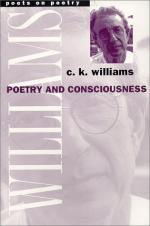|
This section contains 2,263 words (approx. 8 pages at 300 words per page) |

|
SOURCE: “Walking the Line,” in New Republic, August 17–24, 1992, pp. 46–48.
In the following review of A Dream of Mind, Hirsch examines the development of Williams's poetic style and thematic concerns.
C. K. Williams is a poet of disquietudes, of the mind aggressively questioning and requestioning its own workings, brooding upon the fluctuating data of consciousness, quarreling with itself. No other contemporary poet, except perhaps John Ashbery, has given us a more textured or pressurized rendering of what it feels like to think—to try to think—through a situational or mental problem moment by moment: to bring the unconscious into the available light of language, to anatomize the psyche with a continual tally of internal and external evidence.
Behind the acute, painstaking self-consciousness of this work there is a sense that the burden of poetry is to discover the darkest inner truth, to confront the secret that can no...
|
This section contains 2,263 words (approx. 8 pages at 300 words per page) |

|


